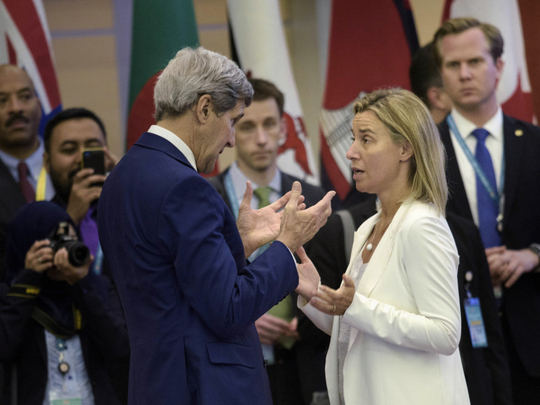
Three weeks after the summer’s ‘Greek drama’ came to an end, some lessons must be drawn. Whoever writes basic truths is often is considered a simpleton. For example, who today would dare say life in Libya was better during Muammar Gaddafi’s time than what it is today? Who would be brave enough to insinuate that if, according to President Recep Tayyip Erdogan, Turkey “is now fighting Daesh” (the self-proclaimed Islamic State of Iraq and the Levant), it simply means it hasn’t done it so far?
It is the same with Europe. It is enough to ask the Europeans directly to obtain a negative answer — for instance, the French referendum in May 2005 on the European Constitution. Yet, whatever the answer, it never stopped the governmental juggernaut — then president Nicholas Sarkozy did not hesitate to by-pass the people’s view with a law a few years later.
In the same time, the frenzy amongst many European governments to avoid a “Grexit” – not to mention the Greeks themselves — was apparently supported by the populations: Greece giving up euro would mean the country leaving the European Union (EU) and, sooner or later, the implosion of the EU itself.
As in a classical Greek theatre, the distribution of roles was perfect: Germany (and its Finnish acolyte) was the bad guy, limiting the horizon of its foreign policy to mere accounting; Greece was the innocent victim, despite a history of lies and theft; and France, the nice guy, upholding “a political vision for Europe” — even though each country was obviously following its own agenda.
There are three possible kinds of European Unions: a liberal, ‘free-frontier’ one, which is favoured by Britain, and logically explains why it is not in the Eurozone; a federalist EU, which tends to make all frontiers disappear and create one single unified European entity; and a confederal EU, the ‘Europe of the Nations’, as Charles De Gaulle would say.
The difficulty is that these three options are running together at the same time, whereas the means should obviously be customised. See the euro: it is indeed useless in an open-ended liberal vision of Europe; but it can also not work if members continue to have separate fiscal and budgetary policies. Pro-Europeans used to argue that the euro would facilitate the next step. But it doesn’t work that way, as experience shows.
As for a single European entity, the people should obviously be asked first, which was never done. Hence, with a progressive lack of interest, the EU came under the guidance of an ever-extending European army of Brussels technocrats, and the Union itself deteriorated — with significant collateral damage, as evidenced by the rise of European populists.
As a whole, the EU cannot go ahead if some work hard and others cheat. It cannot work either if the wealthiest refuse to pay for the poorest — as is normally the case with a national community. Some say it will never happen in Europe, due to the several nations that make up the Union. On the other hand, can the EU limit itself to financing roundabouts (one every one kilometre in some parts of Italy) or ruling that French cheese should only be made of pasteurised milk or that Puglia clams not be picked up unless the diameter exceeds one inch (which is unfortunately never the case)?
First, a European Union can go ahead only if the people wish it – and behave accordingly. Is that the case when there isn’t even one truly European daily TV news programme? When European children are taught a maximum of two (if not one) foreign languages? When the Germans wish to make only foreigners pay tolls on their motorways? Do the people share minimum common values and have a similar vision of democracy — see the European Assembly in Strasbourg where most of those sitting in Parliament were politicians who were defeated domestically?
This is why the people should finally be asked what they do want, and politicians abide by the decisions of the people. People should reflect on what the Union has given them and what could happen if it disappeared. They should take the future into their hands or surrender to unelected bureaucrats.
Europeans deserve to be heard on their readiness to live together, and if so, be offered a pragmatic political programme allowing them to move ahead step by step. It goes far beyond “the traditional Franco-German axis” or “the British willingness to renegotiate”.
Is that the French plan President Hollande announced last week, which would make the Benelux (Belgium, the Netherlands, and Luxembourg), France, Germany and Italy pioneer an autonomous European budget with parliamentary control?
A first step maybe, although two points have now become evident: Europe will never grow if not with the people – and Europe cannot reduce itself to just talking about “unsustainable level of the Greek public debt”.
Luc Debieuvre is a French essayist and a lecturer at Iris (Institut de Relations Internationales et Strategiques) and the Faco Law University of Paris.












